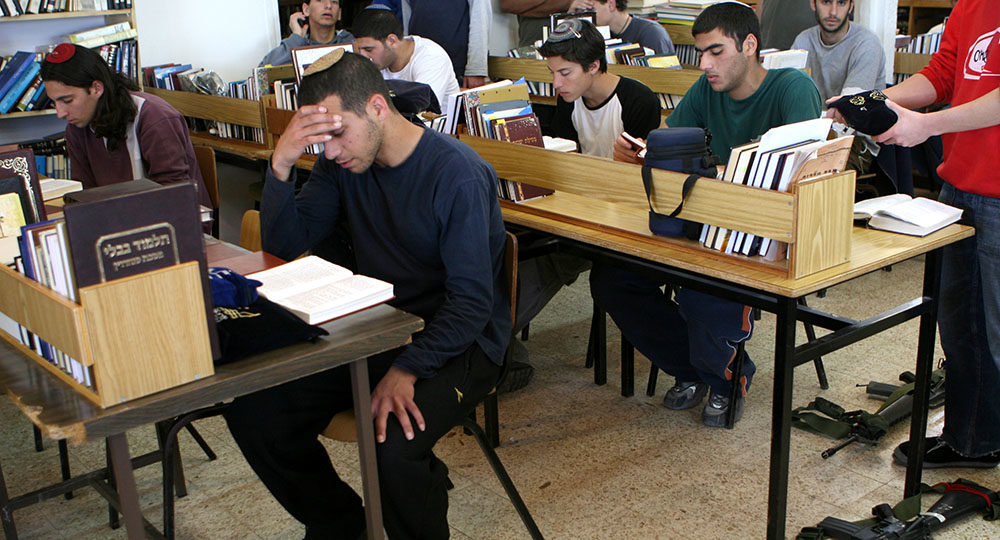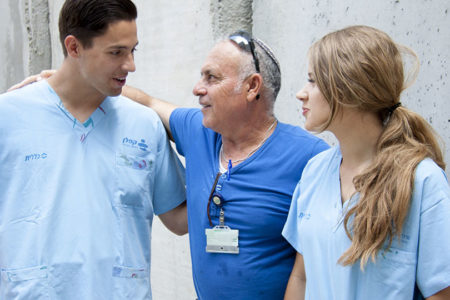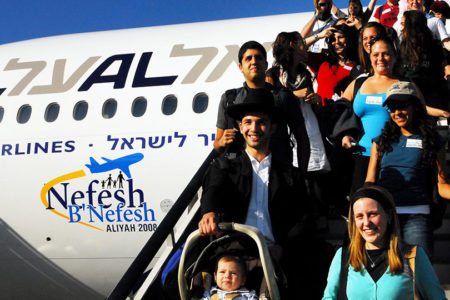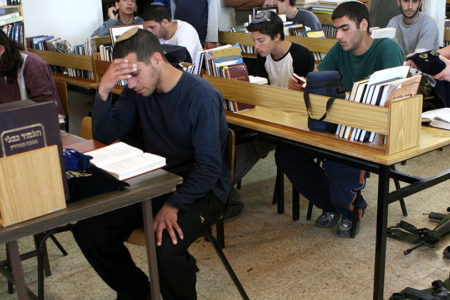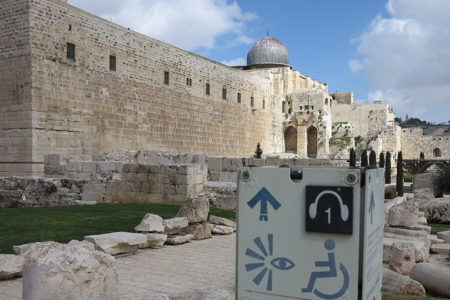Mechina Academies: Israel’s Gap-Year Phenomenon
Some of Israel’s best and brightest high school graduates are delaying military service for a year of character-building in pre-army academies.
It’s still dark in Upper Nazareth as Nadav Cohen, 19, delivers a pithy, inspirational talk to his comrades—choosing Bob Dylan’s The Times They Are A-Changin’ for his theme. On a previous morning, another student talked about the journey to Ithaca in Homer’s The Odyssey. That poem begins, “When you set out on your journey to Ithaca, pray that the road is long, full of adventure, full of knowledge.”
Approximately 35 students, young men and women in workout clothes, have packed into a room overlooking the lower Galilee. All are recent high school graduates who have postponed their compulsory military service (two years for women, three years for men) in the Israel Defense Forces (IDF) to take part in this mechina. It is one of a score of premilitary academies offering one-year programs that are becoming increasingly popular among Israel’s most committed, idealistic, and gifted youth.
The mechina (“preparatory”) phenomenon began in 1988 in Eli, a Jewish settlement in Samaria near Shiloh, to prepare (not merely physically) Orthodox, religious young men for the rigors of army life.
Socially, Israel’s army is like a great melting pot where young people from across the country’s astoundingly diverse society rub shoulders in basic training. That is why the Orthodox young men at the Bnei David-Eli, The Military Yeshiva Academy of Israel, need to be fortified for the culture shock of secular society where they’ll encounter comrades with little knowledge of, or commitment to, the religious values they uphold.
For religious reasons, most Orthodox high schools are all male. Yet in the army, strict separation of the sexes is difficult to uphold. Your instructor for the state-of-the-art Tavor rifle could well be a pretty 19-year-old girl from Ramat Aviv, an upscale north Tel Aviv neighborhood.
Indeed, Israel’s small Messianic Jewish community faces a similar challenge in upholding religious and social values. The Jerusalem Post recently reported that the Messianic community has run a short, preparatory summer program known as the Nestor mechina to ease the transition into army life for its young people.
By 1997, the Eli mechina had been joined by other premilitary academies. Today academies cater to the secular; to young Orthodox women; and to those who want a combined, coed, secular-religious environment.
Rigors of Mechina Life
The Midreshet Lindenbaum on the southern outskirts of Jerusalem offers no fewer than five separate tracks for Orthodox women who want to engage in advanced religious studies (Bible, Talmud, philosophy) before, during, or after their military service. Noa Binnes wants to go into IDF intelligence and opted to study at Lindenbaum “because I think it will help me come to the army a more mature person.”
Today, with hundreds of former students, Ein Prat, The Academy for Leadership, located in the Judean desert east of Jerusalem, is arguably the most prestigious of the pre-army academies. Its ethos calls for bridging the gap between Orthodox, theologically progressive, and altogether nonobservant Israelis, says Noam Arbel, an Ein Prat graduate now responsible for alumni affairs.
This year’s students, for example, are one-third Orthodox; one-third secular; and one-third traditionally observant, Conservative, or Reform. Arbel explains that the program combines community service with advanced Zionist and religious studies and, naturally, physical fitness.
All of Israel’s pre-army academies tend to have rigorous admissions policies and generally require parents to pay tuition, which means most of their students come from middle-class homes.
None are primarily government funded, relying instead on philanthropic support. The AVI CHAI Foundation, in the vanguard of the mechina movement, supports 19 mechina academies, including Ein Prat, which also enjoys the backing of the Tikvah Fund.
The various mechina programs are well regarded by the army, which sees them as a means of delivering more motivated, more mature, and better prepared recruits. There is, of course, one unavoidable side effect: By the time these young people finish all their military service and start university, they’re 24 or so—about the age their American counterparts are receiving advanced degrees.
Devotion to Community Service
Nadav Cohen’s academy, Tavor Mechina, now in its third year, is of the secular variety, emphasizing physical fitness, personal development, self-discipline, social commitment, and leadership skills—all combined with plenty of community service.
Some students, working in teams, mentor Upper Nazareth elementary school or high school students—Jews and Arabs—from less privileged homes or with learning disabilities. They take the children on wilderness hikes or play sports and games with them to instill in them an esprit de corps. Other students work with after-school youth groups for children with special needs.
On other days, Tavor focuses more on learning. Students learn Western philosophy, covering such thinkers as Aristotle, Socrates, and Plato, with emphasis on the values of fidelity to principles and commitment to the law. Other lessons focus on military leadership, where students study such Zionist legends as Joseph Trumpeldor (1880–1920).
Afternoons might find the students in makeshift classrooms learning about national security. Evenings are taken up with less formal lessons. Recently a shepherd-philosopher engaged the students in a discussion about spirituality, identity, relationships, and trust—geared to building group dynamics.
The days at Tabor are typically long and grueling, not ending until the exhausted students fall into bed late at night.
In contrast to Nadav Cohen’s regimented mechina, Yoni Jenson’s academy seems more like a laid-back, urban kibbutz where the 52 students are empowered to make most decisions.
Jenson, 19, put off his army service to enter the mechina in Jaffa, loosely affiliated with Israel’s Reform branch of Judaism, where the mission is to train students for leadership. He plays down the leadership part. “I think of it more as an academy that will prepare me for life, enlighten me, and bolster my self-discipline,” Jenson says.
It was the students’ choice, for instance, to keep a kosher communal kitchen in deference to the needs of only three students who adhere to traditional Jewish dietary regulations that forbid the mixing of meat and dairy. In making their decision, the students studied the basics of what keeping kosher entails while learning a lesson in tolerance: how a majority can uphold its values and respect the needs of a minority.
On a typical day, Jenson might attend an interdisciplinary course about Israeli society that doesn’t sugarcoat the country’s failings. Or he may go to a lecture on the politics of the media. Two periods a week are carved out for meditation and nonconformist prayer. Some of the students organize an optional Hebrew Bible study after hours in their rooms. On alternate weekends the group remains at the mechina for a traditional Friday night Sabbath meal.
There’s a once-a-week workout session under the tutelage of a physical instructor from the army. Jenson, who aims to get into the IDF National Search and Rescue Unit, enjoys regular runs along the Mediterranean coast.
The biggest emphasis at the Jaffa academy, however, is community service. Jenson spends three weekday mornings at a daycare center for disadvantaged children who range in age from three to six. A fourth day is spent at a senior citizen center helping to run its glee club. Other students are assigned to a local scout troop to help with daily activities. This combination of learning and volunteer work is intended to help students formulate their Jewish-Israeli identity in harmony with a modern lifestyle.
Orit Gold, 20, didn’t “do mechina” but chose another form of one-year service before her call-up. Now serving in the IDF Intelligence Corps, Gold (not her real name) put off her army service to spend a year working as a Jewish Agency Shin-Shin—a yearlong volunteer emissary in the United States. It was a broadening experience that exposed Gold, who comes from a secular household in Netanya, to a welcoming, multifaceted Jewish community in the Midwest. Paradoxically, she returned to Israel with an enhanced appreciation of her Jewish identity.
On the down side, Gold’s transition to army life was hardly seamless. In America she was essentially her own boss, running youth programs, addressing local schools and churches about Israel, and managing her own busy schedule. In the IDF, Gold abruptly found herself in basic training with younger girls and under the thumb of a drill instructor her own age. Fortunately, the maturity she honed while abroad helped her deal with whatever the army has thrown at her.
“I learned that you need to take things in stride. The army is a rite of passage for all Israelis, so why not make the most of it, have fun, and learn from the challenges placed before us,” says Gold.
No matter which road they take on their journey to the army, mechina academy alumni arrive better prepared and a little wiser. Nadav Cohen concurs. “The mechina experience takes you off the treadmill of life and puts you on ‘pause’ so that you can purposefully think about your direction.”
